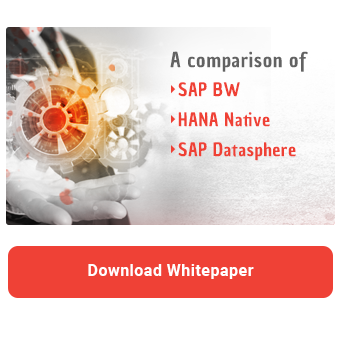On March 08, 2023, SAP unveiled the new evolution of its next-generation, cloud-based data product: SAP Datasphere. Formerly known as "Data Warehouse Cloud" (DWC), the product has been available since 2019 - constantly changing to meet customer demands for a future-oriented data warehouse. With Datasphere, SAP is taking another big step in this direction, but the launch also raises questions about the specific impact on SAP customers and how the innovations should be evaluated strategically.
We talked to Dr. Hagen Jander, Vice President of Data Warehouse Product Management & Strategy at SAP, to explore these and other questions. Following the interview, we will give you an assessment of how we evaluate this step and classify it for the future.
Interview with Hagen Jander, SAP
Hello Hagen, thank you for taking time to talk to us. First, please give us an introduction. What is behind SAP's announcement in the "Data Unleashed" event on March 8 and the SAP Datasphere? What customer needs are you addressing with this?
In many conversations with our customers and data and analytics managers, it is becoming clear that the topic of "data & analytics" is perceived as very relevant and at the same time challenging across industries. Frequently expressed concerns are the easiest possible access to SAP business application data (including metadata and semantic information), an opening of the data/analytics stack for the integration of diverse components, the closer and more agile integration of business departments, and the reduction of complexity in heterogeneous system landscapes. In the Data Unleashed event on March 8, we announced SAP Datasphere, the next generation of SAP Data Warehouse Cloud, and new partnerships with leading technology vendors to address these challenges. SAP Datasphere is designed as a "business data fabric," making it a comprehensive solution that provides easy and scalable access to business-critical data and includes capabilities in data integration (including feathering and replication), cataloging, semantic modeling and data warehousing.
What does this mean for existing SAP Data Warehouse Cloud customers?
With the announcement of SAP Datasphere on March 8, existing SAP Data Warehouse Cloud instances were automatically migrated to the new SAP Datasphere release - retaining all existing functionality and content, and with the ability to take advantage of new functionality in the areas of analytical modeling, data cataloging, and cloudnative mass data replication from that point forward.
What's behind the newly announced technology partnerships?
In line with the aforementioned "Business Data Fabric" approach, our announced technology partnerships want to help our customers simplify their data landscape and add new capabilities to efficiently and securely process critical business data across application boundaries. With Databricks, we are working to integrate data from SAP applications and SAP Datasphere, including its business context and semantic information, with the Databricks Data Lakehouse platform. The partnership with Collibra aims to enable tighter integration of the SAP application world into Collibra catalogs and vice versa - the non-SAP world into the SAP Datasphere catalog. In cooperation with Confluent we address an integration into the Data Streaming Platform and together with DataRobot we create new opportunities in automated machine learning.
Download the whitepaper and find out
which product is best for your data warehousing strategy
When will there be SAP Datasphere certification? Are there any further plans for new learning opportunities?
At the moment, we do not have an official SAP Datasphere Education certification in planning; we are currently working with my team on an openSAP course.
There is only one roadmap item left to see (for Q1/2023) for the Business Builder. In view of the introduction of the new Analytic Model, what about the role of the Business Builder in the future?
The Business Builder will remain in SAP Datasphere and will continue to target business users in the future to create an abstraction of Data Layer complexity. The Analytic Model, which is based on the Data Layer today, focuses on efficiency to cover more basic and complex use cases in modeling. With the introduction of the Analytic Model, we have broadened our spectrum in modeling and introduced an artifact that already includes a variety of richer and improved functionalities such as exception aggregations, hierarchy mapping, etc. In the future, the Analytic Model will support use cases such as Multi -Fact, Stacking and also the Business Layer with Business Entities. Consumption and Fact Models of the Business Layer will be replaced by the Analytic Model.
One of the new Datasphere features is Replication Flow. How does this compare to existing options such as data flows and remote tables with real-time replication?
Like all existing functionalities of the SAP Data Warehouse Cloud, Data Flows and data replication via SDI technology are also included in SAP Datasphere. Replication Flows represent a new cloud-native solution and thus our strategic target direction for mass data replication. This technology has several advantages: For example, unlike SDI technology, it does not require a Data Provisioning Agent component and can easily implement cloud-to-cloud replication scenarios, but also integrate on-premise systems via SAP Cloud Connector.
Finally, we are very interested to know if you have an official abbreviation for SAP Datasphere? DSP?
Internally I have already seen DS and DSP - officially it is SAP Datasphere.
Our assessment of SAP Datasphere
Marketing or content? We immediately asked ourselves this question when the Datasphere Announcement was made. After a detailed examination of the changes in the internal NextLytics Datasphere tenant, evaluation of the new functionalities in our customer projects as well as the strategic input from SAP by Hagen Jander, we believe we can give a verdict.
Datasphere is not just a "Data Warehouse Cloud 2.0".
The name change is not just marketing, but an important sign of SAP's renewed strong commitment to this product and its expanded aspirations. Above all, SAP Datasphere is now establishing itself as a product that goes beyond a simple "data warehouse" and is to be understood more as an integration platform that, in addition to data warehousing functionalities, also delivers a data catalog and data marketplace, among other things. The partnerships with Databricks, Kafka and Collibra underline this integration capability with regard to non-SAP solutions. This deliberate strategic decision by SAP to open up more strongly to 3rd party tools arouses great interest among our technologically broad-based customers.
The product has also developed well in the core area of data warehousing in recent years. SAP Datasphere is becoming increasingly important, especially for existing SAP Business Warehouse (BW) customers. Problems such as the limited migration options have been addressed with the release and continuous further development of the BW Bridge. Also, the coverage of complex use cases in data modeling is already much more mature. There are still deficits compared to the functional scope of SAP BW, but we are encouraged by the track record to date.
It remains to be seen how SAP Datasphere will continue to develop as an integration platform in the course of its strategic realignment and how the technological partnerships will be implemented in concrete terms.
Do you have questions about this or other topics? Are you trying to build up the necessary know-how in your department or do you need support with a specific question? We are happy to help you. Request a non-binding consulting offer today.


























